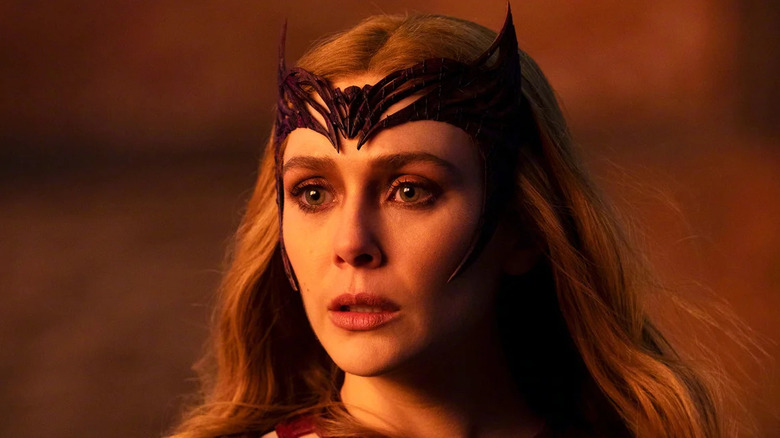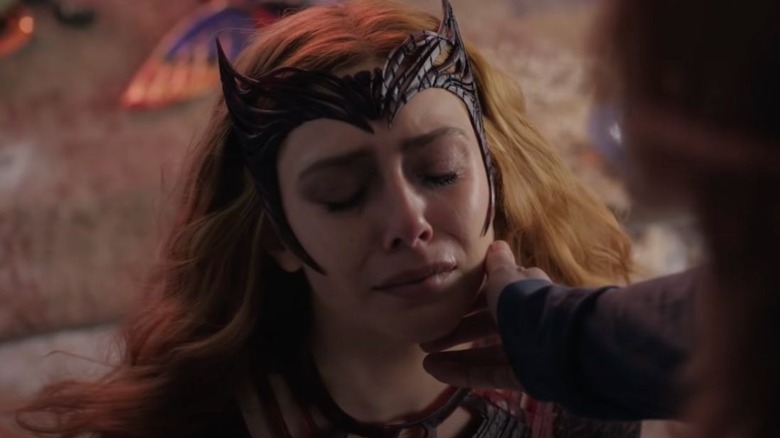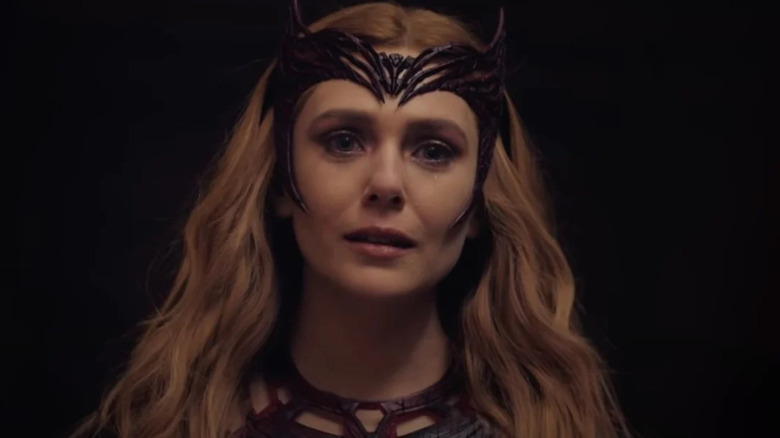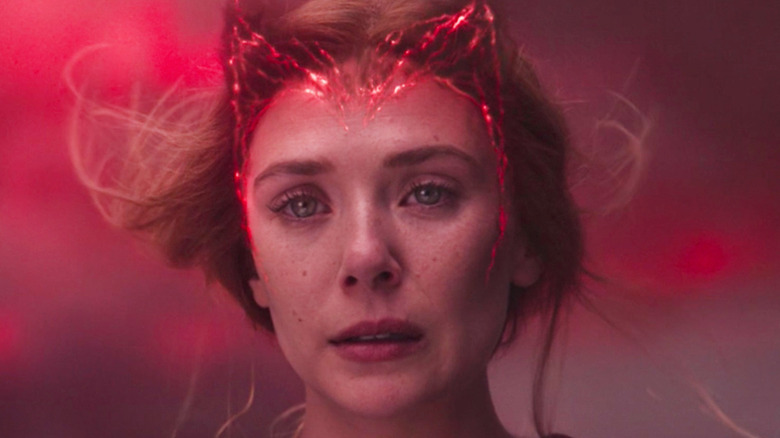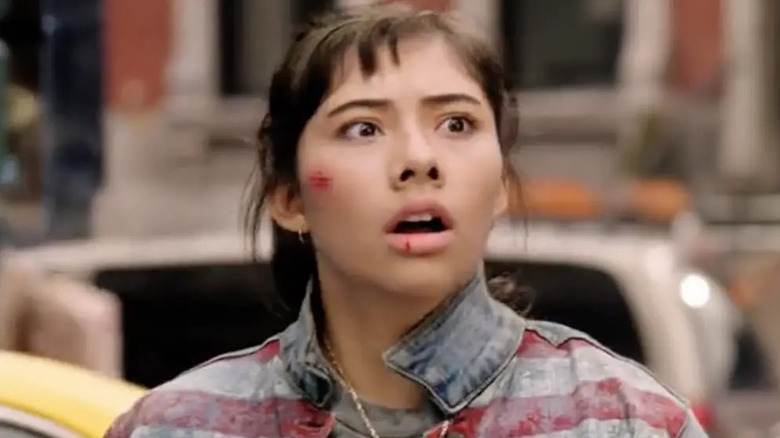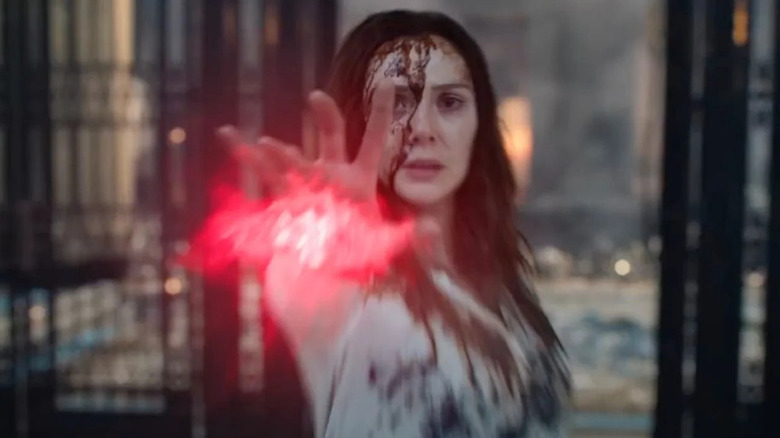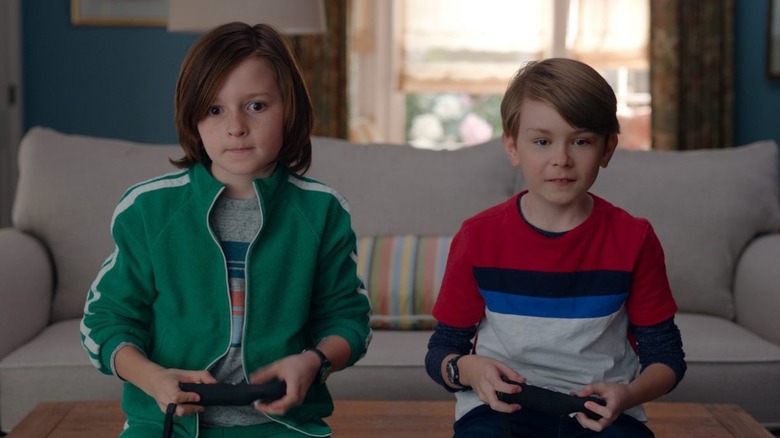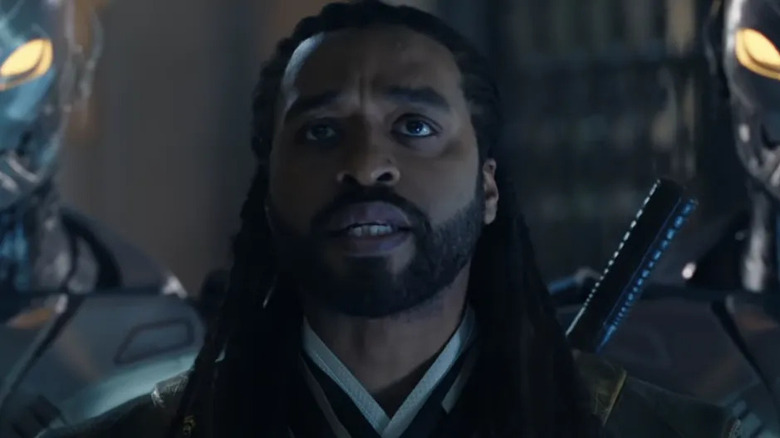Wanda's Darkest Moments In Doctor Strange In The Multiverse Of Madness, Ranked
In the first issue of Jonathan Hickman's now-classic "Powers of X" miniseries, the Fantastic Four captures Toad, Mystique, and Sabertooth — Cyclops intercedes. Though the trio has just stolen a swathe of secret files, he offers his former enemies amnesty. Confused, Sue Richards asks "Cyclops. This amnesty thing ... What are you thinking?" Cyclops' response is measured and chilling: "My family has spent our entire lives being hunted and hated ... Did you honestly think we were going to sit around forever and just take it?"
Wanda Maximoff, a mutant and former Avenger, never asks this question during "Doctor Strange in the Multiverse of Madness." She doesn't have to. Wanda murdered the man she loved unwillingly. His death amounted to nothing. When she turned to the country that her love and she protected, they mined him for parts and left her for the proverbial scrap heap. To paraphrase Doctor Strange, saving the world can't make you happy when the world you made is gone. Wanda's heart, Wanda's home, and Wanda's reason for being didn't return post-blip. All were casualties of being an Avenger. Is it any wonder she doesn't, in the words of Doctor Strange, want back on the lunchbox? Did anyone honestly think she was going to sit around forever and just take it? "Doctor Strange in the Multiverse of Madness" makes the answer clear: No, Wanda won't.
Here are Wanda's darkest moments from "Doctor Strange in the Multiverse of Madness," ranked.
7. Wanda sacrifices herself
In "The Avengers," Captain America lays into Tony Stark. "The only thing you really fight for is yourself," Steve spits. "You're not the guy to make the sacrifice play, to lay down on a wire and let the other guy crawl over you. [For you, there's] always a way out ... You know, you may not be a threat, but you better stop pretending to be a hero."
Wanda Maximoff is a hero. Wanda Maximoff becomes a villain. Like the best villains, the motivation for Wanda's actions is more understandable than anyone might want to admit. The lines she crosses define her. What's lovely but incredibly dark is what it takes to get on the right side of those lines again.
Wanda comes to realize, in the parlance of Captain America, that there's no way out of what she's started. She's caused untold amounts of damage to Earth 838. Her 838 counterparts and 838 children are either scarred or traumatized by her actions. Worse still, Mount Wundagore, the source of the Darkhold's power, is active and thriving. So Wanda Maximoff, hero and villain, decides to lay down on the wire.
Wanda's sacrifice is reminiscent of Doctor Otto Octavius in "Spider-Man 2," but it's infinitely darker given her history. Wanda is a woman toyed with and emotionally abused. Yes, she possessed and enslaved an entire town. Yet Monica Rambeau's words from "WandaVision" ring true too: "No one will ever understand what you sacrificed."
That's truer now than ever.
6. Wanda's lies
The reveal of Wanda as the proverbial big bad of "Multiverse Of Madness" is shocking. More than that, it is sudden. An attempt by Doctor Strange to recruit Wanda's aid almost immediately goes wrong and ends with Wanda promising the capture of America Chavez. This is arguably the film's biggest flaw (save the first end credits scene), but there's also no denying how brutally effective it is. Wanda's lies change her narrative and potentially the course of the MCU forever.
That said, what's frightening and dark is Wanda's ease in fibbing. In "WandaVision," she took pains to construct an entire world that functions as fiction. Her deceptions are elaborate in both tone and scope. They were fanciful. They were well-intentioned. That's not the case here. In the first act of "Multiverse of Madness" (the first act!) Wanda is only interested in deception. Her lies are so simple and effective that it's not even clear what her end game is. Would she have feigned being Stephen's ally only to seize America upon meeting her? Is a surprise attack on Stephen on her mind? The lengths to which Wanda goes by the film's conclusion mean anything could have been on the table.
Even if Wanda has been lying to herself since the start of "WandaVision," the fact that the Darkhold extended that skill to others is bone-chilling. There's no remorse. There's no regret.
5. Haunting herself
"Doctor Strange in the Multiverse of Madness" is more style than substance. That's not necessarily a criticism given that Sam Raimi's slapstick-metal style has been sorely missing from cinema at large, much less comic-book movies, but the film's threadbare story is occasionally muddled to a fault.
Case in point: the narrative of Wanda and the Darkhold. Wanda's sudden shift to full-on villainy in her second "Multiverse of Madness" scene makes it difficult to unpack what actions are driven by the evil magic book and which are a byproduct of Wanda's anger or broken spirit."WandaVision" ends on a remorseful woman who's suddenly "dark-held" by the post-credits. The details are thin at best.
For my money, it is abundantly clear the Darkhold has Wanda when she starts hunting and haunting her 838 self. As the Darkhold-corrupted Doctor Strange proves later, the tome of chaotic magic affects its reader's soul. Wanda Maximoff has reason to hate those who would stand in her way. She has no reason to torture the mother of her children. Granted, that woman has the only thing Wanda wants in the world, but throughout "WandaVision," the soon-to-be Scarlet Witch showed an ability to mete her anger out on a sliding scale. She turned S.W.O.R.D. into the clowns they were. An early punishment of Vision's boss becomes an equally quick plea to save him. 838 Wanda deserves the happiness she has. Darkheld Wanda tries to rip it from her.
The substance of that decision is dark is night.
4. Hunting America Chavez across the multiverse
"Doctor Strange in The Multiverse of Madness" posits that Wanda's children are her everything.
If you believe that Sam Raimi's film shows Wanda breaking bad, then it's notable that she doesn't once mention her husband Vision. Wanda has tunnel vision. Her children are in her dreams. Her children are real and out there somewhere, so Wanda's children are all that matters. If you think Wanda's villainy is the Darkhold driving her actions, then Billy and Tommy are the cracks where its shadows flood in and take hold. In either case, Wanda's brood is the key.
This is why the Scarlet Witch's decision to hunt America Chavez across the multiverse is so emotionally distressing. America is older than Billy and Tommy, but young enough to seem like someone's daughter. Killing adult superheroes of dubious moral character is one thing. Systematically stalking a teenage innocent across many dimensions is another. America, like Wanda, wants to study and understand her power. She is not in full control of her gifts and is, at a bare minimum, resistant to others having or taking advantage of them. That's it. There's no game or ulterior motive for her. What's more, Wanda herself was tortured and experimented upon in the name of acquiring power. That she feels so quickly compelled to do the same to an innocent illustrates just how far she's gone.
3. Dream-walking into her 838 body
One of the most fascinating conceits "Multiverse of Madness" rolls out is that dreams are alternate realities — glimpses of real worlds and actual events. Sometimes, this is played for laughs. In some instances, it's downright chilling. One of the film's best moments is so frightening it's funny. The Darkhold-possessed Doctor Strange tells 616-Stephen, "You know that dream where you're pushed off a building? That was probably me."
That said, this precedent establishes that taking over another version of yourself through dreams is a highly dicey proposition. Wanda, in the throws of the Darkhold, has no problem with it. She occupies her Earth-838 version's body as soon as she can, first to see her children, then to capture America (and massacre the Illuminati in the process). The possession is icky enough. The actions Wanda takes during the possession are what truly make this unconscionable. "Wonder Woman 1984" failed to reckon with the insane ethics of Steve sleeping with Diana while in someone else's body. "Multiverse of Madness" does not have this problem. When, in its third act, the Scarlet Witch stands before her 838-version — her sweater now caked in blood, a slash scarring across her face — the toll taken is clear and incredibly upsetting.
Wanda knows what it is to be used. Her body was a vessel for Baron Strucker's experiments. For her to commandeer anyone, much less herself, so brazenly is the very definition of a dark plot development.
2. Justifying her actions through motherhood
In "Doctor Strange in The Multiverse of Madness," Wanda is closer to Norman Osborn or Otto Octavius than she is an Avenger or even the typical MCU villain.
Like the Green Goblin and Doctor Octopus, Wanda becomes the Scarlet Witch when the life she wants and the people she loves are ripped away from her. All three's desire for control becomes their dark Achilles heel. What's more, each member of this makeshift trio takes a noble profession and uses it to justify unconscionable acts. For Osborn and Octavius, that vocation is science. For Wanda, it is motherhood. This isn't in and of itself dark. A mother's justified wrath has been an essential part of ancient mythology and our modern superheroic canon. Wanda's need to escape from the advice and stewardship of superheroic men is understandable.
What's dark is the moment when Wanda realizes she's lost sight of what she wants. Staring down a crying Tommy (Jett Klyne) and Billy (Julian Hilliard), Wanda rages at both her children and the world, justifying her violence towards 838-Wanda because she is her children's mother. It's an act of delusion. Wanda quickly realizes this, but the fact it goes this far is dark indeed.
1. Slaying the Illuminati
Wanda kills five-sixths of the Illuminati.
That's dark in and of itself. Reed Richards, Captain Carter, Captain Marvel, Black Bolt, and Professor X represent their world's best and brightest, a coalition formed to keep Earth-838 and the multiverse afloat. Their loss cannot be overstated. Yet, it's not the outright murder of the Illuminati so much as how Wanda ends them. Black Bolt has the power to fell his foes with a whisper; Wanda seals his mouth. Reed Richards is the elastic man, so Wanda unravels his every limb, turning him into a pile of human ribbons. Soon after audiences experience the thrill of Peggy Carter carrying Cap's shield (even throwing in an "I can do this all day"), Wanda uses that shield to cut her in two. And Professor X, a man who heals even his enemies by moving through their minds, has his neck snapped by Wanda in her brain. Captain Marvel is lucky just to be crushed.
These deaths aren't just gruesome. They're worse. They're humiliating. Each one picks at its target's specific power set and is drawn out enough for the affected hero to notice. The image of Black Bolt staring at his mouthless face haunts me — so will that of Captain Carter gasping as her shield cuts through her spine. When Thanos kills Loki, he commends the trickster God. When Wanda kills the Illuminati, she makes them unworthy of praise in any way.
That's the very heart of darkness.
